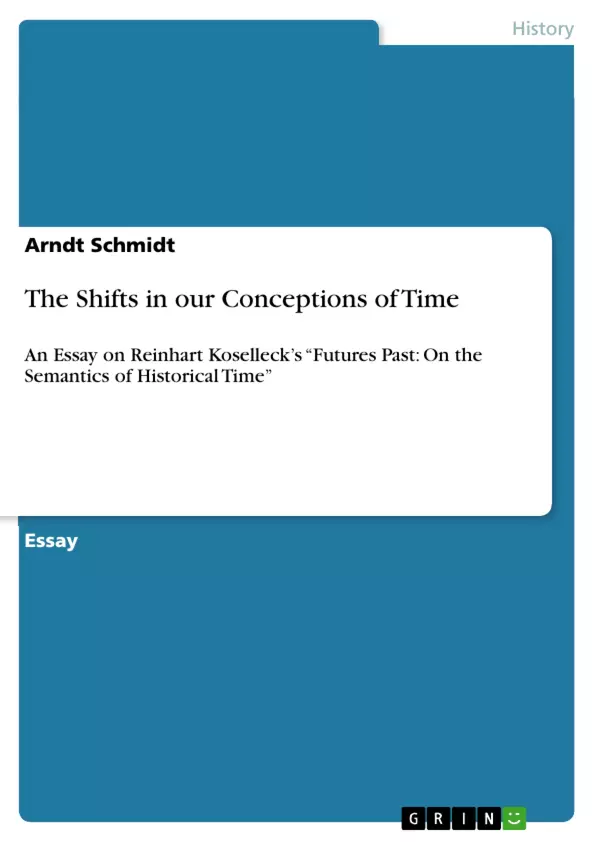On the following pages I would like to outline the main points that Reinhart Koselleck makes in his book “Futures Past” about the semantics of historical time as well as some of the basic assumptions that underlie them. To begin with however, I will take a look at the motifs that have driven Koselleck’s thinking about historical theory and indeed his career as one of Germany’s most renowned historians.
Inhaltsverzeichnis (Table of Contents)
- The Shifts in our Conceptions of Time - An Essay on Reinhart Koselleck's "Futures Past: On the Semantics of Historical Time"
- The Early Years of Reinhart Koselleck
- Reinhart Koselleck's Research Interests and "The Sattelzeit"
- The History of Concepts
- Modernity and the Shifting Relationship of Past and Future
- The Renaissance View of Time
- The French Revolution and a Different Conception of Progress
- The Reformation and the Changing Role of the Church
- The Past as Something Lost and Gone
- The New Convergence of History's Meanings
Zielsetzung und Themenschwerpunkte (Objectives and Key Themes)
This essay explores the central arguments made by Reinhart Koselleck in his book "Futures Past: On the Semantics of Historical Time". The essay highlights Koselleck's analysis of the changing relationship between past and future in the transition to modernity, emphasizing the impact of this shift on our understanding of history and time. It also delves into Koselleck's methodology and the key concepts he employs, such as "Begriffsgeschichte" (the history of concepts) and the "Sattelzeit" (saddle time).- The changing relationship between past and future in the transition to modernity
- The impact of this shift on our understanding of history and time
- The methodology of "Begriffsgeschichte" (the history of concepts)
- The concept of "Sattelzeit" (saddle time)
- The role of modernity in shaping our conceptions of progress and freedom
Zusammenfassung der Kapitel (Chapter Summaries)
The essay starts by outlining the early life and experiences of Reinhart Koselleck, emphasizing the influence of his wartime experiences on his intellectual development. It then delves into Koselleck's research interests, focusing on the period he termed "Sattelzeit" (saddle time) — the transition from the mid-eighteenth century to the mid-nineteenth century — as a crucial period of conceptual change. The essay then examines Koselleck's methodology of "Begriffsgeschichte" (the history of concepts), explaining how he uses this approach to analyze the shifts in meaning of concepts related to historical time, such as revolution, chance, fate, progress, and history itself. The essay explores Koselleck's argument that the emergence of modernity brought a fundamental change in the relationship between past and future. This is illustrated by juxtaposing the eschatological worldview of the Renaissance, where the past was seen as cyclical and repetitive, with the modern conception of progress, where the past is considered as lost and gone, opening up the possibility of a future shaped by human action. The essay highlights Koselleck's analysis of how the Reformation and the ensuing Religious Wars led to a shift in the interpretation of history and a new emphasis on human agency. It argues that the rise of modernity resulted in a newfound focus on the future, viewed as indeterminate and open to a multitude of possibilities, while the past became increasingly detached from the present. Finally, the essay examines the evolution of the concept of history itself, tracing the distinction between "die Historie" (the mere account of events) and "die Geschichte" (the actual events themselves) and how the emergence of modernity led to a shift in understanding history as a singular and unique subject.Schlüsselwörter (Keywords)
This essay explores the key themes of historical time, modernity, concept history, "Begriffsgeschichte," "Sattelzeit," the relationship between past and future, progress, freedom, and the evolution of the concept of history.
Excerpt out of 7 pages
- scroll top
- Quote paper
- Arndt Schmidt (Author), 2008, The Shifts in our Conceptions of Time, Munich, GRIN Verlag, https://www.grin.com/document/189024




